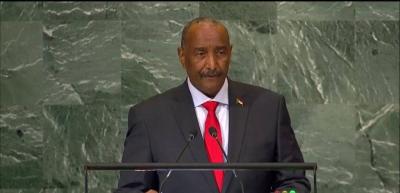Sudanese army leader Abdel Fattah Al-Burhan stated that he did not seek military support during a recent regional tour, emphasizing his preference for a peaceful resolution to the conflict that has claimed thousands of lives and displaced millions of civilians. In an interview with Reuters, Al-Burhan also mentioned that he requested neighboring countries to stop sending mercenaries to support the paramilitary Rapid Support Forces (RSF). The war between the army and the RSF erupted in mid-April due to plans to officially integrate the RSF into the army as part of a political transition following the ousting of long-time president Omar al-Bashir in a popular uprising four years ago.
Speaking on the sidelines of the United Nations General Assembly in New York, Al-Burhan stated, "Every war ends with peace, whether through negotiations or force. We are pursuing both paths, and our preferred path is the negotiation route. There is the Jeddah process, and we are optimistic that we may reach a positive outcome." Al-Burhan has made a series of foreign visits in recent weeks after remaining in Sudan during the initial months of the war amidst escalating fighting. He added that the purpose of these visits was to seek solutions, not military support, but he urged other countries to halt external assistance that the RSF is reportedly receiving.
He pointed out, "We have asked our neighbors to help us monitor the borders to stop the flow of mercenaries. There are many foreign fighters in these forces who have come from all neighboring countries and will pose a danger to the Sudanese state and the region in the future." Al-Burhan denied accusations against the army, describing them as propaganda from his rivals. The RSF also denied responsibility for violent acts in Darfur, stating that it would hold its men accountable for any violations. Al-Burhan noted that the army's deployment in Geneina, which witnessed severe mass killings in Darfur, was limited, hindering its ability to respond.




